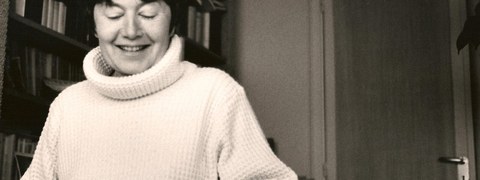Apr 11, 2024
Irigaray & Anarchism | Vortrag von Anja Lind | 14th Meeting of the Irigaray Circle: Touching the World | 6.-9. Juni | University of Iceland, Reykjavík
Irigaray & Anarchism
Anja Lind at the 14th Meeting of the Irigaray Circle: Touching the World
June 6-9
University of Iceland, Reykjavík
From June 6–9, Anja Lind will be travelling to the “14th Meeting of the Irigaray Circle: Touching the World” at the University of Iceland, Reykjavík, where she will present on part of her dissertation work, with a paper entitled “Irigaray & Anarchism”:
Laura Roberts’ Irigaray and Politics concludes with an evocative gesture toward International New Municipalism. Grounded in Irigaray’s (2002, 14) insistence that the common(s) ought be defined by proximity, and not by property, by “closeness with others” and not by “rules,” “goods” and “borders,” and pinpointing the cornerstone of her ‘women’s politics’ as a “community made up of autonomous relational sexuate subjects, in non-appropriative and non-hierarchical relations with each other” (Roberts 2019, 150), Roberts suggests that it is municipalist organising—decision-making at a very local scale, allowing for direct, participatory and subject-to-subject communication—that may most faithfully represent the politics of sexuate difference. What Roberts does not have space to consider is the intriguing ramifications which emerge from heralding a municipalist framework, the central figure of which—Murray Bookchin—was an (almost) life-long anarchist, his libertarian municipalism arising directly out of anarchist ideals, theorised to directly target the usurping of the commons by property, and centrally concerned with politics taking place at the human-scale—between autonomous subject-to-subject members of the same community, in direct participation.
This paper takes up this connection, arguing that the political “revolution” Irigaray (2002, 127) calls for follows a distinctly anarchist formulation: the breaking of hierarchies to insist upon horizontal relations; the anti-capitalist critique; the simultaneous necessity “to reground singular identity and to reground community constitution” (Irigaray 2002, 3); indeed her very description of community as “composed of autonomous individuals in conscious relation to one another,” as opposed to “an undifferentiated whole of citizens organized by an instinct, a will, an idea, or a leader, whether it be the leader of a horde, of a tribe, of Church or of State” (Irigaray 2002, 102–103). Anarchism as political theory is centrally concerned (in its social/communist forms) with the dialectical relationship between the autonomous individual and the community; with the breaking of all forms of hierarchy; and with the explicit rejection of an undifferentiated, atomised, depoliticised amalgam beneath the leader and the state. This paper suggests that Irigaray’s politics, and Roberts’ examination thereof, may be enriched with a reading of anarchist scholarship, in particular as it is expressed by Bookchin, not least because of their shared concern with proximity. Bookchin’s formulation of anarchist justice (1991, 148) precisely articulates the differentiation key to Irigaray’s project: society must be organised not around a liberal fantasy of ‘equality,’ failing to consider the differences between members of a community—the “inequality of equals,” in which injustice stems from a fiction of perfect (bodily) equality, the domination of the same—but rather around the “equality of unequals,” an equality built upon the inherent recognition of difference, be it sexuate, ability, or any other relevant marker. Piecing together the sparse and tentative connections made between Irigaray and anarchism so far—in the work of Lewis Call (mainly 2002), in Seònaid Mary-Kate Espiner’s dissertation (2019), and indirectly in Mario Klarer (1992)—and through a close reading of Bookchin, this paper suggests that the projects of sexuate difference and anarchism could mutually enrich one another.
Keywords: politics, anarchism, hierarchy, proximity, community
Bibliography:
- Bookchin, Murray. 1991. The Ecology of Freedom. Montreal: Black Rose Books.
- Call, Lewis. 2002. Postmodern Anarchism. Lanham: Lexington Books.
- Espiner, Seònaid Mary-Kate. 2019. “How Should We Live? A Study of Social Critical Theory, Feminist Utopianism, Anarchism and Eco-political Thought.” PhD diss., Lincoln University.
- Irigaray, Luce. 2002. Between East and West. New York: Columbia University Press.
- Klarer, Mario. 1992. “Gender and the ‘Simultaneity Principle’: Ursula Le Guin’s ‘The Dispossessed.’” Mosaic: An Interdisciplinary Critical Journal 25 (2): 107–121.
- Roberts, Laura. 2019. Irigaray and Politics: A Critical Introduction. Edinburgh: Edinburgh University Press.

